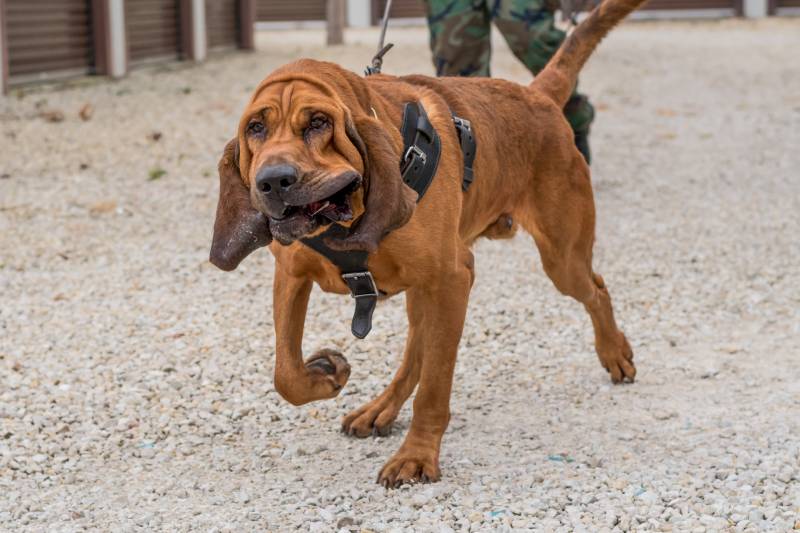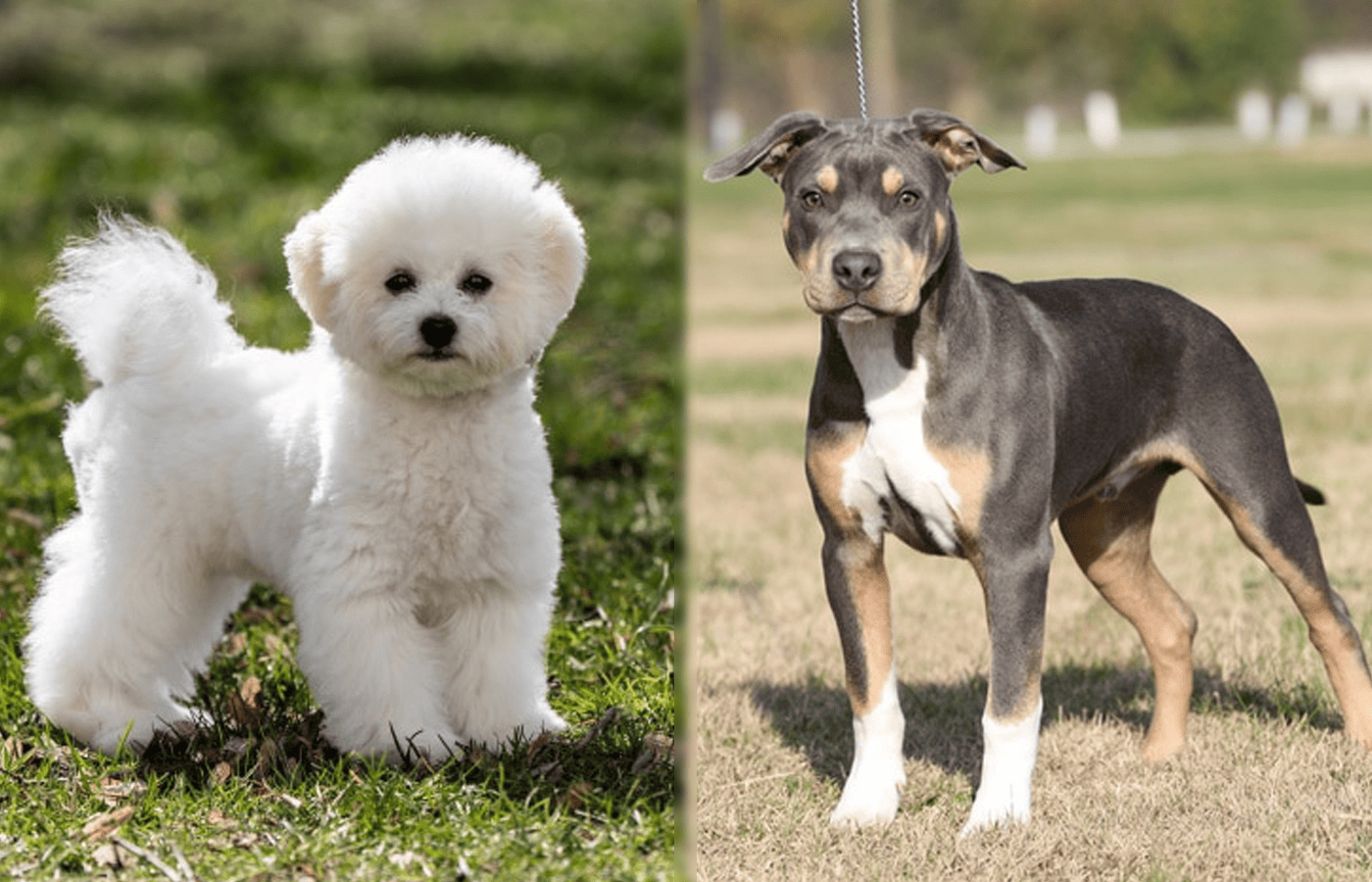Click to Skip Ahead
Meet the Bloodhound – a dog breed characterized by its droopy ears, soulful eyes, and a nose that’s nothing short of legendary. With an incredible ability to track scents over vast distances, Bloodhounds have earned a reputation as the ultimate scent detectives. But just how smart are they? Are their remarkable tracking skills a testament to their intelligence, or is there more to the story?
Canine intelligence encompasses a variety of areas. While working and obedience intelligence may not be their strong suit, the Bloodhound definitely ranks highly when it comes to instinctive intelligence.
Canine intelligence can be complicated, especially when it comes to the highly specialized Bloodhound. Read on as we uncover the mysteries behind Bloodhound’s brilliance and reveal the unique strengths that set them apart from their furry counterparts!
Understanding Canine Intelligence
When it comes to assessing intelligence in dogs, it’s essential to shift our perspective. Canine intelligence isn’t limited to acing IQ tests or solving puzzles; it encompasses a wide range of skills, from problem-solving and memory to social interaction and specialized abilities. Different dog breeds exhibit varying forms of intelligence, tailored to their specific roles and characteristics.

The Variability in Intelligence Across Dog Breeds
Dogs, like people, display a spectrum of cognitive abilities. Some breeds, such as Border Collies and Poodles, are celebrated for their quick learning and adaptability, while others, like Bloodhounds, excel in unique areas that are closely tied to their original purpose.
How Is Intelligence Measured in Dogs?
Evaluating intelligence in dogs involves a combination of observation, problem-solving tasks, and interaction tests. These assessments gauge a dog’s capacity to learn, apply knowledge, and respond to various situations. However, it’s crucial to recognize that traditional intelligence tests might not capture the full depth of a dog’s capabilities.
According to Canine Psychologist Dr. Stanley Coren, canine intelligence can be broken down into 3 dimensions, namely Working and Obedience Intelligence, Adaptive Intelligence, and Instinctive Intelligence.
Working and Obedience Intelligence refers to how fast a dog can learn commands while also taking into consideration their obedience, which is the primary area where the Bloodhound ranks rather low on the intelligence scale.
Adaptive Intelligence and Instinctive Intelligence, on the other hand, are where the Bloodhound excels. Adaptive Intelligence refers to whether a dog can think independently, and Instinctive Intelligence looks at how a dog performs in tasks that they are bred for. Bloodhounds are known for their acute and extraordinary sense of smell. This makes them incredible scent trackers and they have excelled in this task throughout history.

So, How Smart Are Bloodhounds?
To fully comprehend Bloodhound’s intelligence, we must delve into their history. These dogs trace their lineage to medieval Europe, where they were bred for their incredible sense of smell and tracking aptitude. This ancestry imbued them with an innate knack for detecting scents over vast distances.
As a result, while they might not excel in obedience training like some other breeds, their exceptional sense of smell and tracking abilities are unparalleled. This makes them exceptionally intelligent within their specialized domain.
Based on Coren’s criteria of canine intelligence, the Bloodhound performed rather poorly in the obedience and working dimension of canine intelligence as exhibited by their difficulty in learning new tricks, requiring more repetitions than other breeds.

Bloodhound Intelligence vs. Other Breeds
Comparing Bloodhounds’ intelligence with that of other breeds requires a shift in perspective. Rather than measuring them against conventional criteria, it’s essential to recognize their specialized skills.
On the conventional criteria, Bloodhounds do not even fall in the Top 100 Smartest Dog Breeds list. But just because they rank lower on the intelligence scale does not mean they are unintelligent dogs. Rather, they are skilled and more specialized in the specific tasks that they excel in. Bloodhounds may not be considered trainable dogs but are considered highly instinctive at the skill of tracking and using their noses!
Bloodhounds stand out not for their ability to sit on command but for their prowess in scent detection, which has proven invaluable in various applications.
The Bloodhound: The Highly Skilled Tracker
Bloodhounds’ origins lie in the world of hunting and tracking. Their extraordinary olfactory capabilities made them indispensable for hunting game and locating missing persons. Their ability to navigate diverse terrains and follow complex trails set them apart as highly specialized and uniquely intelligent animals.
Bloodhounds are nature’s engineers, perfectly designed for their roles. Their drooping ears and wrinkled skin around the face serve as tools that help funnel scents towards their incredibly sensitive noses. This adaptation enables them to discern and follow individual scents even in challenging environments.

Bloodhounds in Real Life
The true test of Bloodhound’s intelligence is found in their real-world accomplishments. Whether it’s tracking fugitives through difficult landscapes or locating missing individuals in urban settings, Bloodhounds consistently demonstrate their exceptional skills. Their persistence, determination, and ability to stay on the scent trail make them invaluable assets in search and rescue operations and criminal investigations.
Bloodhound Trainability
While Bloodhounds might not conform to traditional obedience training norms, their intelligence reveals itself in their distinctive trainability. Their independent nature and innate curiosity can be harnessed with the right approach. Understanding their instincts and motivations plays a pivotal role in effectively training and utilizing their unique abilities.

Final Thoughts
In the grand tapestry of dog intelligence, Bloodhounds occupy a unique and significant niche. Their intelligence isn’t confined to standard measures; it’s a complex blend of history, specialized skills, and remarkable instincts. While they might not fit the mold of conventional obedience, their unmatched scent detection abilities and success stories in diverse fields underscore their distinctive brilliance.
The next time you witness a Bloodhound diligently following a scent trail, remember that their intelligence is a product of centuries of partnership with humans, adaptation to their roles, and a reflection of the astounding capacities of the canine mind. It’s a reminder that true intelligence goes beyond the expected and into the realm of specialization and uniqueness.
Featured Image Credit: Edoma, Shutterstock










